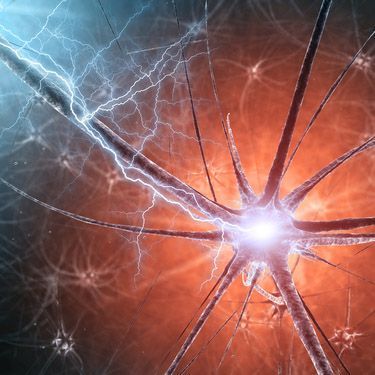People with diabetes should consider a slight tweak to Michael Pollan’s oft-quoted dietary dictum: “Eat food. Not too much. Mostly plants.”
Make it “Only plants,” and they can markedly reduce the burden of neuropathy, one of the most painful and debilitating consequences of diabetes.
 According to a study published recently in the journal Nutrition & Diabetes, following a vegan diet may help to reduce neuropathic pain in people with diabetes.
According to a study published recently in the journal Nutrition & Diabetes, following a vegan diet may help to reduce neuropathic pain in people with diabetes.
Roughly 60% of all type 2 diabetes patients experience neuropathy. Conventional treatment approaches are typically focused on pain management and blood sugar control, sometimes with medications that have significant side effects.
Healthful eating is one of the most effective strategies for maintaining normal blood glucose levels. Previous studies have identified a correlation between a vegetarian diet– one potential example of a healthy diet — and improved glycemic control in individuals with type 2 diabetes (Yokoyama, Y. et al. Cardiovascular Diagnosis and Therapy. 2014; 4(5): 373-382). But far less is known about the effects of plant-based diets specifically on neuropathic pain.
There are studies suggesting that eliminating all animal-derived foods can reduce other complications associated with diabetes, which prompted a group of researchers from the Physicians Committee for Responsible Medicine in Washington, DC to hypothesize that going vegan might also provide relief from neuropathy (Bunner, A. et al. Nut & Diab.(2015).
Tingling & Burning
They recruited DC-area patients with type 2 diabetes and painful diabetic neuropathy of at least six months’ duration through local physicians and media outlets. The cohort included subjects between the ages of 18 and 65 years, with a mean age of 57 years. Exclusion criteria were: vitamin B12 deficiency, alcohol consumption of more than two drinks per day, the use of recreational drugs in the previous six months, pregnancy, unstable medical or psychiatric illness, and current adherence to a vegan diet.
Prospective participants were tested for vitamin B12 deficiency — a known cause of neuropathy independent of diabetes — using a B12 blood level test and a serum methylmalonic acid test. The researchers assessed neuropathy via screening interviews, defining neuropathy as the experience of painful sensations such as tingling, burning, or freezing in their hands or feet.
After screening, 35 eligible participants were randomly assigned to the study’s intervention or control group. All subjects were asked to keep their diabetes medications constant during the study when possible.
Subjects in the intervention group were asked to follow a low-fat, exclusively plant-based diet for 20 weeks. The intervention diet focused primarily on vegetables, fruits, grains, and legumes. It omitted all animal products, limited fat intake to 20-30grams perday, and favored low-glycemic index foods.
Additionally, intervention group subjects participated in weekly nutrition classes through which they received education and social support in following the prescribed vegan diet. They also took 1,000mcg of methylcobalamin, a form of vitamin B12, once daily.
The control group also took the daily B12 supplement, but made no other dietary changes and received no other intervention. In fact, they were told not to make major dietary changes during the 20-week period.
The B12 supplement was intended provide a credible placebo for the control group, as well as to prevent deficiency among intervention group subjects, particularly those who elected to continue eating vegan after the study concluded.
The researchers gathered clinical, laboratory, and questionnaire data at the study’s onset, midpoint, and conclusion. Assessments included an analog “worst pain” scale, the Michigan Neuropathy Screening Instrument, a global impression scale, the Short Form McGill Pain Questionnaire, the Neuropathy Total Symptom Score, a weekly pain diary, and the Norfolk Quality of Life Questionnaire.
At the completion of the study, they observed a number of improvements on clinical and pain measures among subjects who followed the vegan diet.
Multiple Benefits
The authors saw significant improvements in pain among those following the vegan diet.  Pain scores on the Short Form McGill Pain Questionnaire, declined by 9.1 points in the intervention group, but just 0.9 points in the control group (P=0.04). Additionally, while electrochemical skin conductance in the foot decreased in the control group, it stayed essentially constant in the vegan diet group, suggesting that, “the intervention may have slowed or halted sudomotor nerve function decline.”
Pain scores on the Short Form McGill Pain Questionnaire, declined by 9.1 points in the intervention group, but just 0.9 points in the control group (P=0.04). Additionally, while electrochemical skin conductance in the foot decreased in the control group, it stayed essentially constant in the vegan diet group, suggesting that, “the intervention may have slowed or halted sudomotor nerve function decline.”
In addition to reducing pain, the vegan diet conferred a number of other health benefits.
The vegan group showed a greater decrease in both body weight and body mass as compared to the control group. Body weight declined by a mean of 7.0kg over 20 weeks among the vegans, as compared with 0.6kg in the control group (P<0.001).
Total cholesterol declined by 12.1mg/dl in the vegan group, but just 2.2mg/dlin the control group (P=0.20). Low-density lipoprotein cholesterol decreased by 7.8mg/dl in the vegan group, but it increased by 0.4mg/dl in the control group (P=0.35).
Compared with the controls, more of the vegans were able to reduce their lipid-lowering medications (4 vs 0), and fewer needed to increase their doses (one vs. three) during the study period.
Hemoglobin A1c (HbA1c) decreased significantly (a mean reduction of 0.8%) in the vegan group, but remained unchanged in the control group (P=0.07).
The results of this pilot study point to the potential value of a plant-only diet for people with diabetic neuropathy. Admittedly, adherence is challenging, especially for people who have been eating meat, dairy and other animal-based foods for many years. The authors note that many patients will need strong support from healthcare professionals, family, and friends while making a transition to a vegan lifestyle.
Judging from the results of this trial, the health payoff for making that shift can be tremendous.
END







